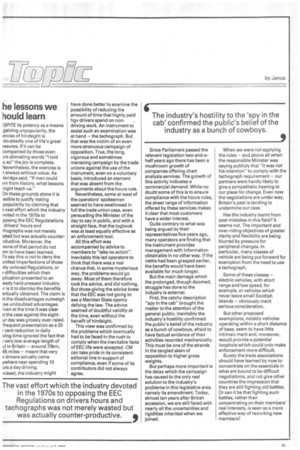he lessons we hould learn
Page 53

If you've noticed an error in this article please click here to report it so we can fix it.
:SPITE its potency as a means gaining unpopularity, the ercise of hindsight is doubtedly one of life's great 3asures. If it can be companied by those even )re alienating words "I told u so" the joy is complete. Nevertheless, the exercise is t always without value. As leridge said, "If men could im from history, what lessons night teach us."
On these grounds alone it is ssible to justify risking popularity by claiming that p. vast effort which the industry voted in the 1970s to posing the EEC Regulalations drivers' hours and ;hographs was not merely isted but was actually counter3ductive. Moreover, the
,sons of that period do not am to have been learned. la say this is not to deny the inifest imperfections of those ;tly unloved Regulations, or difficulties which their plication presented to an eady hard-pressed industry.
■ r is it to dismiss the benefits antually obtained. The claim is it the disadvantages outweigh )se undoubted advantages. Even at the time it was clear it the case against the eightur day was grossly over-rated. frequent presentation as a 20 r cent reduction in daily ving time ignored the fact that very low average length of ul in Britain — around 70km, 45 miles — meant that very v drivers actually came ywhere near spending 10 urs a day driving.
ndeed, the industry might
have done better to examine the possibility of reducing the amount of time that highly paid hgv drivers spend on nondriving work. An instrument to assist such an examination was at hand — the tachograph. But that was the victim of an even more strenuous campaign of opposition. True, the long, vigorous and sometimes menacing campaign by the trade unions against the use of the instrument, even on a voluntary basis, introduced an element that was absent from the arguments about the hours rule.
Nevertheless, some at least of the operators' spokesmen seemed to have swallowed in full the trade union case, even persuading the Minister of the day to say in public, and with a straight face, that the logbook was at least equally effective as an enforcement tool.
All this effort was accompanied by advice to members to "take no action". Inevitably this led operators to think that there was a real chance that, in some mysterious way, the problems would go away. Most of them therefore took the advice, and did nothing. But those giving the advice knew that the EEC was not going to see a Member State openly defying the law. The advice seemed of doubtful validity at the time, even without the benefit of hindsight.
This view was confirmed by the problems which eventually had to be faced in the rush to comply when the inevitable facts of EEC life were accepted. CM can take pride in its consistent editorial line in support of compliance, even if some of its contributors did not always agree. Since Parliament passed the relevant legislation two-and-ahalf years ago there has been a mushroom growth of companies offering chart analysis services. The growth of this activity indicates a commercial demand. While no doubt some of this is to ensure compliance with the hours rules, the sheer range of information offered by these services makes it clear that most customers have a wider interest.
Quite contrary to what was being argued by their representatives five years ago, many operators are finding that the instrument provides management with information obtainable in no other way. If the nettle had been grasped earlier, the benefits would have been available for much longer.
But the main damage which the prolonged, though doomed, struggle has done to the industry is external.
First, the catchy description "spy in the cab" brought the matter to the attention of the general public. Inevitably the industry's hostility confirmed the public's belief of the industry as a bunch of cowboys, afraid to have factual evidence of their activities recorded mechanically. This must be one of the strands in the tangled skein of opposition to higher gross weights.
But perhaps more important is the delay which the campaign has caused to the only real solution to the industry's problems in this legislative area, namely its amendment. Today, almost ten years after British accession, we are still faced with nearly all the uncertainties and rigidities inherited when we joined. When we were not applying the rules — and above all when the responsible Minister was saying publicly that "it was not his intention" to comply with the tachograph requirement — our partners were hardly likely to give a sympathetic hearing to our pleas for change. Even now the negotiations are under way, Britain's past is tending to undermine our case.
Has the industry learnt from past mistakes in this field? It seems not. The important and over-riding objectives of greater clarity and flexibility are being blurred by pressure for peripheral changes. In particular, many classes of vehicle are being put forward for exemption from the need to use a tachograph.
Some of these classes — electric vehicles, with short range and low speed, for example, or vehicles which never leave small Scottish islands — obviously merit serious consideration.
But other proposed exemptions, notably vehicles operating within a short distance of base, seem to have little intrinsic merit and, moreover, would provide a potential loophole which could only make enforcement more difficult.
Surely the trade associations should have learned by now to concentrate on the essentials in what are bound to be difficult negotiations, and not give other countries the impression that they are still fighting old battles. Or can it be that fighting such battles, rather than concentrating on their members' real interests, is seen as a more effective way of recruiting new members?






















































